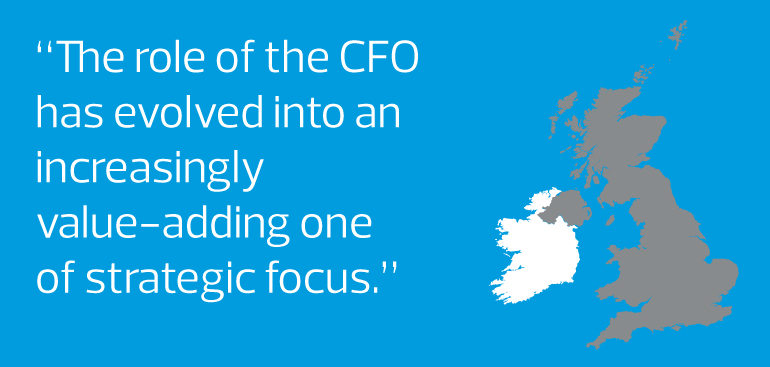Since the UK’s Brexit referendum in June 2016, businesses have faced a lingering threat of disruption to the usual commercial trading flows. In this time of uncertainty, companies have relied on the CFO as a central leader of the organisation to guide the most appropriate path forward through Brexit.
Our Tax Director Paddy Stapleton wrote for the Chartered Accountants weekly newsletter eBriefly. You can read the full article here.
Traditionally, the CFO was the guardian of the financial health of an organisation. Over the past decade, technological efficiencies have advanced the automation and sophistication of compliance and reporting. In turn, the role of the CFO has evolved into an increasingly value-adding one of strategic focus. The role now includes anything from achieving organisational objectives to support strategic and operational decision making. The CFO now shares strategic leadership responsibilities with the CEO and is at the centre of any significant project. This central role requires the person appointed as CFO to have the capability to balance short-term concerns with long-term considerations – a skill regularly called on since the Brexit vote but made especially difficult in uncertain circumstances. Some might say Brexit woe for the CFO.
The sector, complexity and size of the business, as well as supply chain operations are significant factors that influence how quickly the business, and the CFO, can implement an effective Brexit strategy.
So what Brexit-strategies have moved businesses to Ireland? Let’s take a high-level examination of Brexit-related inflows to Ireland and potential future developments.
Financial services
The large visible Brexit moves to Dublin have been in financial services. Corporate service providers and professional service firms supporting the industry are building new operations in Dublin. Leading global banks have moved significant operations to the capital, while others already here are building functions in response to Brexit. Fintech companies previously regulated in the UK have acquired e-money licences from the Central Bank of Ireland, and more are likely to follow regardless of the Brexit outcome.
The need for certainty in being able to service EU business broadly determines the path of financial services. The decision for the CFO and other leaders in these businesses became a question of ‘where’ rather than ‘whether’.
Preparation for other sectors
The common driver for other industry sectors is securing existing market share and holding a structure that minimises disruption and costs. Preparations involve legal entity planning, changing or developing new supply chains, stock management and recruitment or relocation of existing resources. For many UK businesses, it is a strategic decision to absorb costs and the additional compliance and reporting involved to ensure the existing business is secure in the event of a no-deal Brexit scenario. Others have made preliminary preparations, such as establishing legal entities that can be quickly resourced to house EU business post-Brexit.
Foreign direct investment
The UK has traditionally been the EU’s number one destination for inbound foreign direct investment (FDI). Brexit is changing this. Research published by the UK Trade Policy Observatory in October 2018 showed that FDI inflows have reduced by 19% since the 2016 vote. While it’s too early to judge the quantum of impact on FDI inflow to Ireland, three factors – Ireland’s common law system, its position as being the only English-speaking EU country following Brexit, and its efficient corporate tax regime – places Ireland as the natural destination for a significant proportion of new investments.
In my view, regardless of a hard- or soft-Brexit, it is likely that more CFOs making FDI decisions will look to Ireland and other competitor jurisdictions than they did before. It is difficult to plan for an unknown outcome. Taking on investment decisions in such circumstances requires leadership, especially so for CFOs operating in SME businesses managing in tighter conditions. However, as in any change environment, the cost of doing nothing is unaffordable.
Paddy Stapleton is a Tax Director in RSM Ireland.

